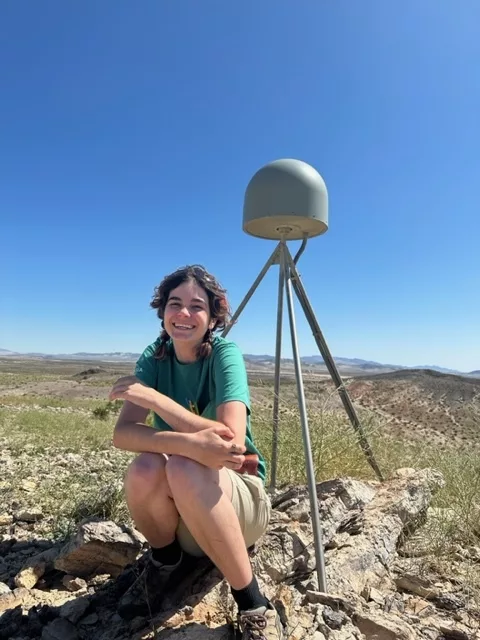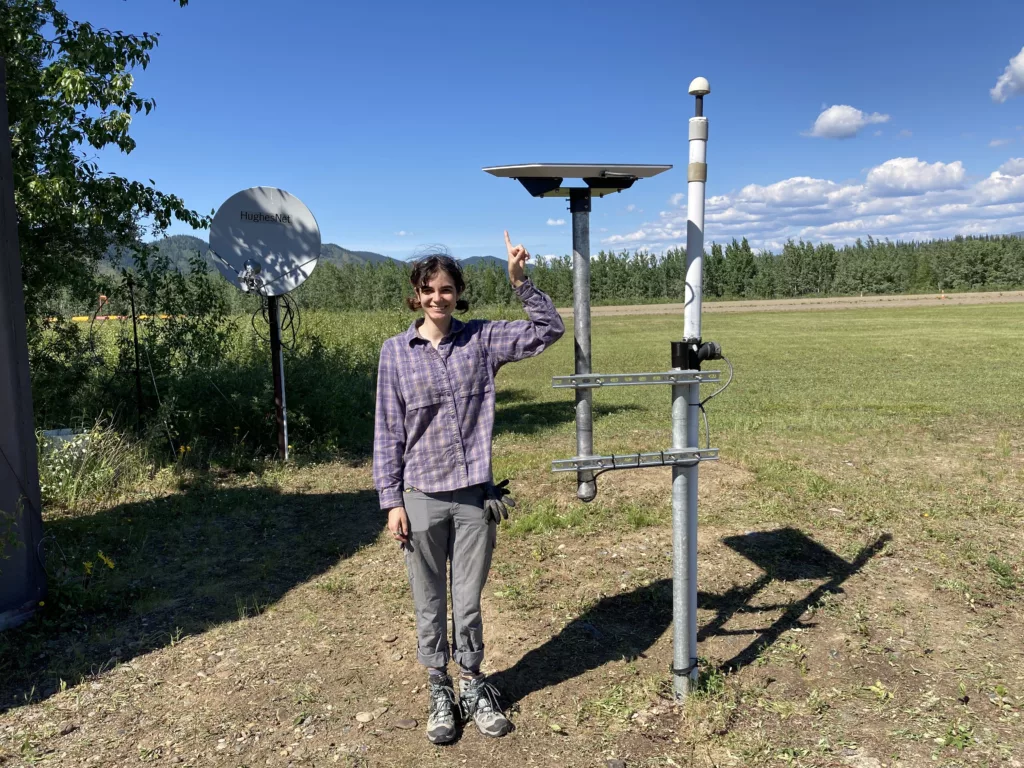


This summer we’re introducing interns from Student Career, RESESS, and Geo-Launchpad programs to highlight their research projects and how EarthScope programs further their career goals.
Quincey Nielson (any/all) is EarthScope’s Summer 2024 Alaska Field Engineer Career Intern working with Ryan Bierma. They’re currently in Anchorage, but have been and will continue to move around Alaska throughout the season for their internship program. Quincey is from Las Vegas, Nevada and is entering their fourth year at Georgia Institute of Technology for their bachelors in solid Earth and planetary science.
Quincey has been conducting research for three semesters at Georgia Tech involving evaluating normal faults in the Puerto Rico trench system to predict tsunamis that pose a threat to Puerto Rico and other nearby islands. They attended the Seismological Society of America annual meeting in May 2024 to present their research at a poster session and will be writing their undergraduate thesis on this research.
Ever since Quincey was in kindergarten, they loved planetary science. At the time, they lived in California and were very fascinated by all the earthquakes that happened, to the point where they were determined to be a seismologist. At Georgia Tech, they were originally in aerospace engineering due to their love of planets, before they switched into environmental, and then the Earth and Atmospheric Science Department, where they are now extremely happy to be able to reconnect with old interests from when they were a kid.
Q&A
What are you doing in your internship right now?
It’s definitely been interesting to apply a lot of the skills I learned at school to the real world. When I did my field work for a course this last semester it was very directed by the instructors. We were doing all of the instrumentation testing and things like that, but all of the logistics were planned by the instructors, and they were heavily supervising us. That was really useful, because that was my first experience in the field, and it would have been a disaster if they weren’t there watching over me and the other students. But I’ve really gotten a taste of how much logistics and planning goes into the field work out here [in Alaska], and also the attitude that something is always going to go wrong while we’re out there. Instead of planning for everything to go perfect, we have to plan for a degree of being extemporaneous and thinking of solutions on the fly. There are a lot of qualities that have been different from the field work I’ve done before, as well as just being in a completely new environment where the weather is a lot more of a concern, and having the animals that can impact the instrumentation. There’s a lot of stations that get attacked by bears, which was not something we had to worry about in the California place. But it’s been really useful, really fun, and cool seeing new sites. I think it is really interesting, it’s fun, and it makes me excited to be doing this work.
What has a day-to-day schedule been like for you so far? You are doing a lot of warehouse work, but what does that entail, versus going out to a station? And what do you do at a station?
It depends on the day. When people go and do their field work, they take a lot of photos, and there’s this big database that hasn’t been updated, so I’ve been helping them to catalog all the photos. That’s sort of the project I work on if there aren’t any other tasks, because there’s thousands of photos. But in the warehouse there’s a lot of cleaning out supplies, getting things organized and prepared for the trips, and also getting the new antennas ready. We’re doing a lot of antenna updates, specifically changing some of them from being GPS stations to GNSS stations, and also changing stations from using VSAT to using Starlinks [communication devices]. There’s been a lot of working on those instruments specifically. Like this morning, I was doing antenna swaps, taking out components, which is always fun because it’s kind of a repetitive activity, but it still requires very basic technical skills, and so it’s fun to do. It’s super different from when we’re in the field, where it depends on where we’re at what the tasks are. But, for example, at one of the stations that we did last month, we flew out to the station and we were doing a battery swap. So we had a bunch of these 80 pound batteries and while my manager, Ryan, was changing out the satellite dish, I was swapping the antennas kind of underneath the building in this crawl space, dragging these 80 pound batteries for a few hours. I went over to the antenna and swapped it out so that it was an updated system and would be connected to GNSS, and so that’s usually what it looks like. There have been other stations where something broke, either because there was a bear or it was vandalized, and so we have to replace parts. But it’s very varied, and we never really know. We kind of guess what the problem is before we get out there and get out there, and sometimes it’s not what you guessed it was, but I would say that’s kind of the day-to-day experience.
What’s been your favorite part of the program so far?
My favorite part has definitely been getting to see new places. We’ve been flying on really small planes, like non-commercial planes, or on float planes. That’s been my favorite because I’d never done that before, and getting to very remote sites that way is really exciting. There’s always just really cool sites because it’s the Alaskan wilderness, it’s pretty empty and very cold and snowy. I’ve just loved seeing the nature out here, and also getting to do a job that’s very technical and hands-on is really appealing to me.
Is there anything upcoming that you’re really excited about in the remaining weeks?
We’re doing more fieldwork next week, which I’m really excited about. The fieldwork that we did last month was on Kodiak Island, so we had to fly to those sites because there’s not a really big road system there. There’s a lot of really small islands that we were going out to. Now we’re doing field work in Alaska’s interior, so it’s going to be a lot of driving, kind of a road trip, driving several hours a day to each site and inspecting them off the side of the road. So I’m really excited to see what the inside of Alaska looks like, because I’ve never been here.
How did you find this internship or what attracted you to it initially?
I found it through my research advisor. He told me that I should look into the EarthScope internships, either for the RESESS program or the Career internships. I saw that this one was posted, and it was kind of one of the first jobs I’d seen where I actually felt pretty qualified, because the requirements were things you don’t usually see—things like, “experience with wilderness first aid” and “comfortable with extensive travel” and things like that. So I immediately applied to it. It was kind of my top pick. And I love being outdoors and doing the fieldwork stuff, and so I was really happy that I got it, and I feel like it’s been a really perfect fit. I feel like sometimes when I get a job or research activity, I’m a little bit underprepared. I feel like here I’ve known what to do and have felt really comfortable with my skill set, and so it’s been a really good match, and I’ve been really happy. I still can’t believe that I’m out here. I can’t believe EarthScope is taking interns to do this kind of work. So I’ve been really happy that they were prepared to let an intern do so much varied work and stuff that actually has a material impact. I’ve been really happy with it. Thanks EarthScope!
Quincey is hoping to teach in their home school district after finishing their bachelors as a way to help address the teacher shortage the district has experienced. They really enjoy interacting with students in middle school and high school and hope to put their past experiences tutoring to good use. Eventually, Quincey hopes to complete a masters in geophysics with an aim of having a career with a heavy fieldwork component. Their internship with EarthScope will help prepare them to find a job that uses a lot of practical skills and hands-on work.

